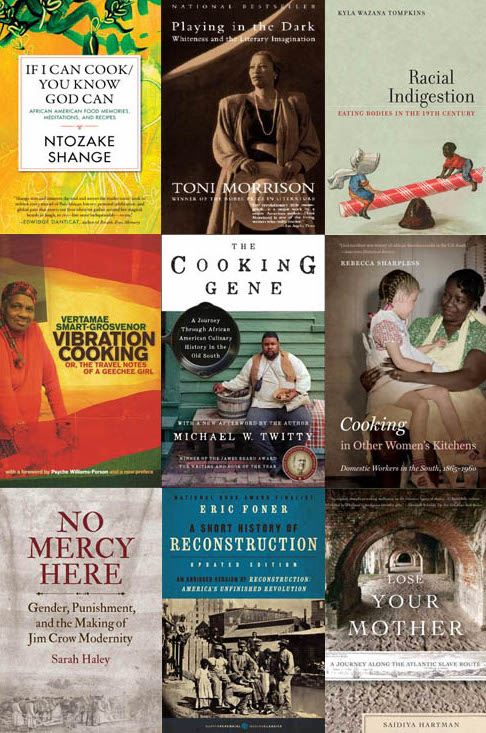Vital Strategies recently launched a new learning forum for staff to broaden their knowledge within and beyond public health, to engage with new ideas and frameworks for thinking about the world.
For the inaugural event in the series, photo-ethnographer Oriana Koren and historian Dr. George Aumoithe took us on a journey to retrace the traditions and history behind Juneteenth, the oldest nationally celebrated commemoration of the ending of slavery in the United States.
We asked Oriana Koren and Dr. George Aumoithe to share with us their reading recommendations, which you can explore below. Their roundup features titles such as “Cooking in Other Women’s Kitchens,” an account of how African American domestic workers shaped southern food and “Lose Your Mother,”a thought-provoking look at the history of the Atlantic slave trade told through the author’s personal journey seeking survivors of her lineage in Ghana.
The Cooking Gene by Michael Twitty
A renowned culinary historian, Twitty offers a fresh perspective on race in a memoir of Southern cuisine and food culture that traces his ancestry through food, from Africa to America and slavery to freedom. From tobacco and rice farms to plantation kitchens and backbreaking cotton fields, he tells his family’s story through the foods that enabled his ancestors’ survival across centuries. –Amistad Books
Playing in the Dark by Toni Morrison
Morrison explores the “Africanist” presence in the works of white authors of fiction such as Poe, Melville, Cather and Hemingway, showing how “themes of freedom and individualism, manhood and innocence, depended on the existence of a black population that was manifestly unfree.” This novel from the Nobel Prize-winning author promises to change the way we read American literature. –Vintage Books
If I Can Cook/You Know God Can by Ntozake Shange
Shange delivers a delightful “tribute to black cuisine as a food of life that reflects the spirit and history of a people… with recipes such as ‘Cousin Eddie’s Shark with Breadfruit’ and ‘Collard Greens to Bring You Money,’ Shange instructs us in the nuances of a cuisine born on the slave ships of the Middle Passage, spiced by the jazz of Duke Ellington, and shared by generations across the African diaspora.” –Beacon Press
Cooking in Other Women’s Kitchens by Rebecca Sharpless
Sharpless provides an intriguing account of the lives of African American women engaged in domestic work from Reconstruction to the beginning of the Civil Rights Movement. Cooking was a central role of the jobs African American women performed, feeding generations of white families, and shaping southern food and culture in the process. Sharpless explores how African American cooks worked to exercise control over their lives, despite facing discrimination, long workdays and low wages. –The University of North Carolina Press
A Short History of Reconstruction by Eric Foner
In this updated, abridged edition of Reconstruction, Foner redefines how the post-Civil War period was viewed. He chronicles the way Americans responded to the end of the war and slavery; exploring emancipated slaves’ search for equal citizenship, the evolution of racial attitudes, and the emergence of a nation proclaiming commitment to the principle of equal rights for all. –Harper Perennial Modern Classics
Lose Your Mother by Saidiya Hartman
In this thought-provoking novel, Hartman looks at the history of the Atlantic slave trade through a personal journey she took along a slave route in Ghana. Finding no survivors of her lineage in Ghana as she had hoped, she faces the blank slate of her genealogy. Throughout the journey, she encounters both people in the present and figures from the past whose entire lives were shattered by the slave trade. –Farrar, Straus and Giroux
No Mercy Here by Sarah Haley
Haley brings to light the economic exploitation and debasement of imprisoned Black women in the late nineteenth and early twentieth centuries. Women were forced to work as convict laborers and as domestic workers before they were allowed their freedom. No Mercy Here shows “how the system of incarceration was crucial to organizing logics of gender and race, and constructing Jim Crow modernity.” –University of North Carolina Press
Racial Indigestion by Kyla Wazana Tompkins
Tompkins combs through rare and visually moving archives of children’s literature, architectural history, domestic manuals, dietetic tracts, novels and advertising to explore linkages between food, visual and literary culture in the nineteenth-century United States, to reveal how eating becomes a political act, “linked to appetite, vice, virtue, race and class inequality.” –New York University Press
Vibration Cooking by Vertamae Smart-Grosvenor
Part cookbook and part memoir, Vibration Cooking “focuses on food as a source of pride and validation of black womanhood and black ‘consciousness raising.’” Smart-Grosvenor introduces us to a rich cast of characters and places, detailing her travels around the world; perfecting omelettes in Paris, enchiladas in New Mexico, biscuits in Mississippi, and feijoida in Brazil. Through her travels, she learns that the universal language is a well-cooked meal. –University of Georgia Press
Can you recommend any other books about African American history? Let us know! Tweet us @VitalStrat
Learn more about Oriana Koren and Dr. George Aumoithe’s work by visiting their websites: Oriana Koren and Dr. George Aumoithe
